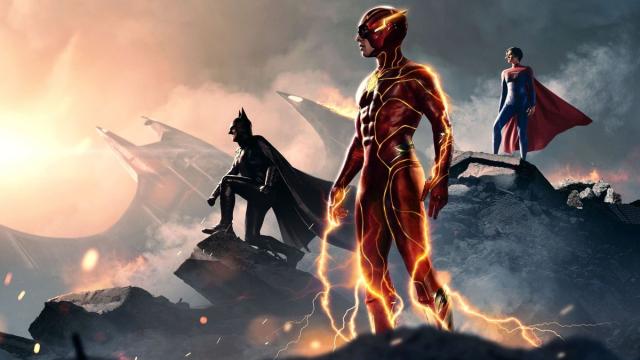It’s often impossible to watch something completely divorced from the context surrounding it. Despite what some may have you believe, once you know about the controversy attached to a film or show, you can’t un-know it, and that’s going to affect how you view the finished product in question.
Right now, Warner Bros. is learning this the hard way with The Flash. After about two months of pre-release positive buzz, the film ultimately crashed and burned at the box office and is looking like yet another albatross around DC’s neck. The film becoming a dud isn’t really noteworthy in and of itself; what’s more interesting is why audiences didn’t really turn up for the movie. Everyone’s got their own answer to give, with the most common replies being that allegations against Ezra Miller hovered over everything like a bad smell, and the film got thoroughly upstaged by Spider-Man: Across the Spider-Verse just two weeks prior. Almost any answer given is likely to be completely valid, but for what it’s worth, I think one of the things that really kneecapped the movie was the fact that we already knew how it would end.

Warner Bros. has been trying to make The Flash for effectively a decade, but at San Diego Comic-Con 2017, its then-official title was Flashpoint. It’s a name that carries a lot of weight for DC’s speedster: in 2011, Geoff Johns and Andy Kubert published a comic book miniseries with that title, and whose ultimate end result was wiping comic book canon clear to create the New 52, a hard reboot for the DC universe. As such, the purpose of the Flashpoint movie was clear: WB was going to use Ezra Miller’s Barry Allen to reboot itself out of the corner it painted themselves in when it became clear most audiences weren’t really onboard with Zack Snyder’s DCEU movies. Even as other movies like Birds of Prey and Aquaman were showing the DCEU could still work, the mission statement for The Flash has never wavered.
Because of that, and the fact that WB was openly looking for someone to create an interconnected universe of DC movies and shows, it sort of sucks the tension out of the speedster movie. And it’s not the only DC flick to have this problem — since we know James Gunn is clearing the deck with Superman: Legacy in 2025, it may be that audiences don’t really show up for either Blue Beetle or Aquaman 2 later this year. Should that be the case, it’s the fault of no one but WB. What it’s wanted this whole time was the same thing other studios wanted during the 2010s, and even now: the success of interconnected stories that took Marvel to pop icon status and billion dollar hits like Black Panther, Spider-Man: No Way Home, and all four Avengers movies.
Nearly every studio has tried to have their own big franchise hit, with varying degrees of success. But one common trait they all share is that at some point, you can feel the movie being bent backwards into something it’s not. Maybe it’s in the middle of the movie, or maybe it’s at the very end, but the franchising always rears its head. Sony’s done that bending more than most, what with the end titles for Amazing Spider-Man 2 in 2014 and then the bonkers post-credits bit for last year’s Morbius. Paramount’s the most recent example of this; Transformers: Rise of the Beasts from earlier in the month spends its last five or six minutes clearly building up to something, which ends up being an interconnected universe between the Robots in Disguise and Hasbro’s G.I. Joe. And who can forget — not that we ever really could — Universal’s Dark Universe, and the photo from 2017 that remains up on Twitter as a monument to the dreams hitched onto its one and only instalment, The Mummy.
Witness the beginning of a #DarkUniverse. pic.twitter.com/8g9eIbQfGa
— #DarkUniverse (@darkuniverse) May 22, 2017
Even Marvel has gotten progressively worse at it over time. Ant-Man & the Wasp: Quantumania is basically nothing more than two hours and change of hyping up Jonathan Majors’ Kang as a big threat before he takes the stage in a multiverse-heavy Avengers duology. Last year’s Doctor Strange in the Multiverse of Madness stops at its halfway point so its cameo characters can underline the big endgame for Phases Four through Six. It isn’t that we don’t know these stories are building up to something — how could we not, after all this time? But again, knowing that this is all going somewhere robs the story in question of its immediacy.
There are movies that manage to pull off the franchising without it being jarring; Across the Spider-Verse managed to make folks forget that it was going to be a two-parter. But for the most part, it’s now all too easy to see the workers behind the curtain when it comes to these blockbusters. That kind of blatant engineering lost its charm some time ago, and it may soon be that audiences get particularly selective about what it sees. Once that happens, studios will have no one to blame but themselves.
